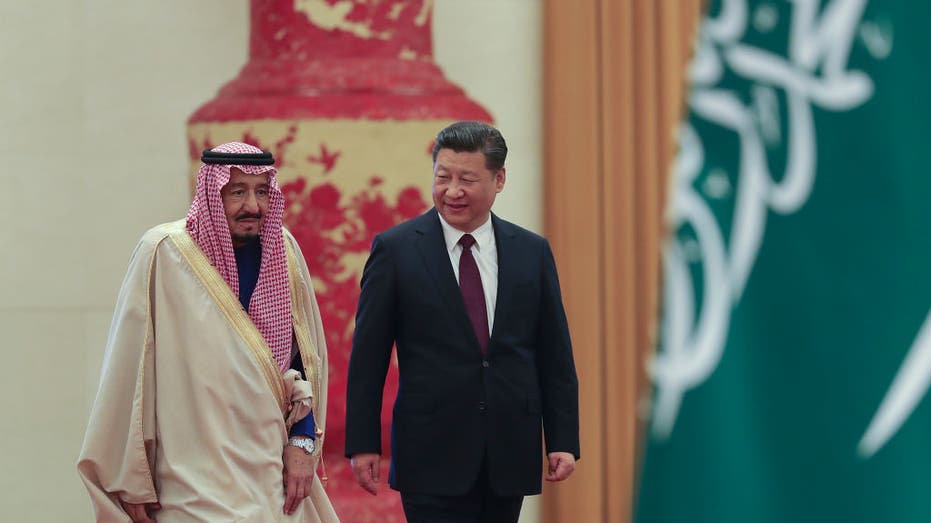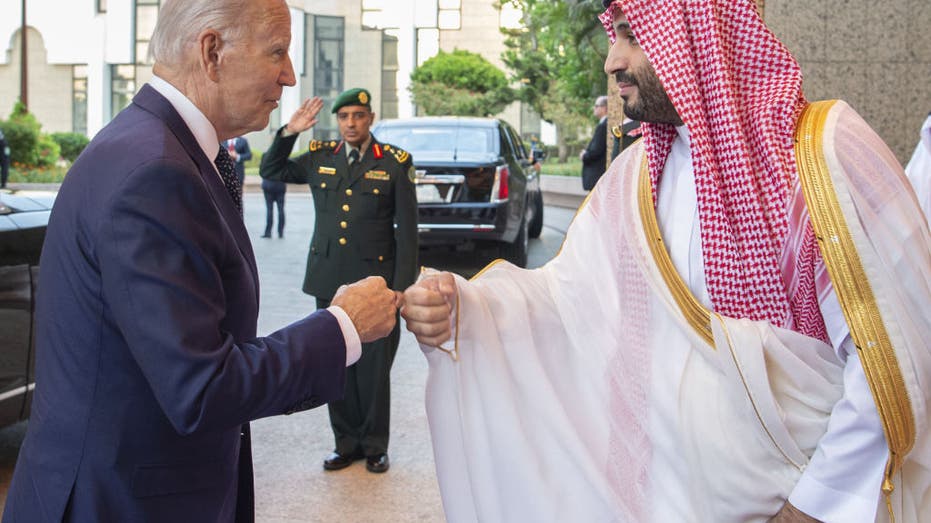China’s Xi Jinping meets with Saudi rulers in economic power play: 'No longer a competitor'
U.S. still holds Saudi Arabia responsible for death of Jamal Khashoggi
China's Xi Jinping is 'experiencing his biggest challenge': Raleigh
Senior contributor for The Federalist Helen Raleigh joins "Varney and Co." to discuss her op-ed regarding the protests in China and how they are problematic for Xi Jinping and a potential China-Russia partnership.
Chinese President Xi Jinping will visit Saudi Arabia this week for meetings that could see tens of billions of dollars invested in the country.
"I would argue that this is a big turning point," Dr. Theodore Karasik, the fellow on Russian and Middle Eastern affairs at the Jamestown Foundation, told FOX Business. "It's probably an inflection point for the region in terms of China's presence, and it means that Beijing is no longer a competitor to them."
"Because of the shifting security environment, and because of where geoeconomics is heading, the logical choice for the Saudis is to go east," he added.
Xi will land in Saudi Arabia on Thursday to kick off three days of meetings between leaders of the two nations, aiming to strengthen an already rosy partnership between Beijing and Riyadh: China has ranked first for Saudi Arabia’s exports and imports since 2018, according to the Saudi Press Agency.
QATAR SIGNS 27-YEAR GAS DEAL WITH CHINA

Chinese President Xi Jinping, right, invites Saudi Arabia's King Salman bin Abdulaziz Al Saud to view an honor guard during a welcoming ceremony inside the Great Hall of the People on March 16, 2017, in Beijing. (Lintao Zhang/Getty Images / Getty Images)
The visit occurs as the U.S. and Saudi relations remain strained following the 2018 murder of Washington Post columnist Jamal Khashoggi, which allegedly happened at the direct approval of Saudi Crown Prince Mohammed bin Salman, which has overcast all U.S.-Saudi interactions in the following years.
Biden’s recent visit to Riyadh during the summer did not appear to yield the kind of progress the U.S. had desired. Reports following the visit indicated that the prince came away unimpressed with the president.
Biden also raised concerns that Saudi Arabia’s agenda appears to align more with that of Russia than that of the United States — Washington and Riyadh have sparred over oil production as gas prices rose following sanctions against Russia for its invasion of Ukraine and as OPEC+ refused to renege on its plan to decrease production over the coming months.
US DEBT EXPLOSION FUNDED BY AMERICANS, NOT FOREIGN COUNTRIES, POSING RISKS TO ECONOMIC GROWTH
Gordon Chang, China expert and senior fellow at the Gladstone Institute, argued that Biden’s pursuit of the Joint Comprehensive Plan of Action with Iran, which would net the country billions of dollars in fresh funds – is something that would make life increasingly difficult for Saudi Arabia.
"Biden’s Mideast policy has tilted toward Iran, and so Tehran's enemy, Saudi Arabia, is furious at Washington," Chang told FOX Business. "As a result, the Saudi royals are more open to working with China."
"We should not be surprised by the region turning away from Washington," he continued. "America on Jan. 20, 2021, transitioned from the best, most successful Mideast policy to what is turning out to be the worst."

President Biden, left, is welcomed by Saudi Arabian Crown Prince Mohammed bin Salman at Al-Salam Royal Palace in Jeddah, Saudi Arabia, July 15, 2022. (Royal Court of Saudi Arabia/Handout/Anadolu Agency via Getty Images / Getty Images)
"We cannot think there will be no adverse consequences. We are, among other things, quickly losing friends in Riyadh and in the capitals of the Gulf Cooperation Council."
And Xi’s visit can further widen that gap as the crown prince seeks further investment from China. Former President Donald Trump’s visit in 2017 yielded some $100 billion in contracts for the U.S. military industry, but the kingdom has already established contracts far in excess of that with China – such as the $500 billion NEOM zone project.
US MANUFACTURING ORDERS IN CHINA DROP 40% AMID COVID-19 LOCKDOWNS: REPORT
"After two years of Biden policy towards Saudi Arabia whiplashing between pariah and fist bumps, it’s understandable that the Kingdom would be wary of too much dependence on Washington these days," Victoria Coates, Senior Research Fellow at the Margaret Thatcher Center for Freedom and a former Deputy National Security Advisor for Middle Eastern and North African Affairs, told FOX Business. "China is Saudi’s single largest customer so it’s not surprising that they would meet."
Coates who is on the advisory board of the Vandenberg Coalition continued, "All those who recognize the critical importance of the US-Saudi alliance over many decades need to send clear signals that America is not abandoning the Gulf," she said. "While we have no objection to Saudi selling oil to China, the U.S. must remain the partner of choice on technology and security, and opening up those sectors to the PRC is the one thing that could shake the foundation of our partnership."

President Joe Biden, right, and Chinese President Xi Jinping shake hands before their meeting on the sidelines of the G-20 summit, Nov. 14, 2022, in Nusa Dua, Bali, Indonesia. (AP Photo/Alex Brandon / AP Newsroom)
A spokesperson for the U.S. State Department told FOX Business they would defer to China’s foreign ministry regarding details of the visit, to which a Chinese foreign ministry spokesperson provided no comment during a press conference Tuesday.
The State Department spokesperson stressed that the Biden administration has "consistently" made the point that the U.S. has never asked countries "to choose between the United States and the PRC" or "any other country."
"Our goal is to give countries around the world a choice and to make the choice of the United States and what we bring to the table the most attractive option available," the spokesperson said. "The United States remains deeply committed to security in the Middle East, and our comparative advantage in building coalitions, partnerships, and integrating defensive structures is unmatched."
BIDEN ADMIN DRAGS ITS FEET ON TIKTOK SECURITY DEAL AS REPUBLICANS SOUND ALARMS
The crown prince has focused on helping to diversify his kingdom’s economic interests as the world shifts away from oil and gas, with some countries already banning the production of gas-powered cars in the next 20 years.
The Saudi Press Agency reported that sideline meetings during the Saudi-Chinese summit could result in more than 20 agreements worth SAR110 billion – roughly $29 billion – in addition to further strategic partnership deals between the two countries.
But the final details of those deals – and what compromises each side ends up making – will indicate how aligned the two nations are on their goals, according to Karasik.
CLICK HERE TO GET THE FOX BUSINESS APP
"From a U.S. perspective, the best outcome would be that some of these contracts remain memorandums of understanding or indifferences during the three different summits show a lack of a unified position between specific Gulf States and Asia," Karasik said.
The Ministry of Foreign Affairs for the Kingdom of Saudi Arabia did not respond to a FOX Business request for comment by the time of publication.





















